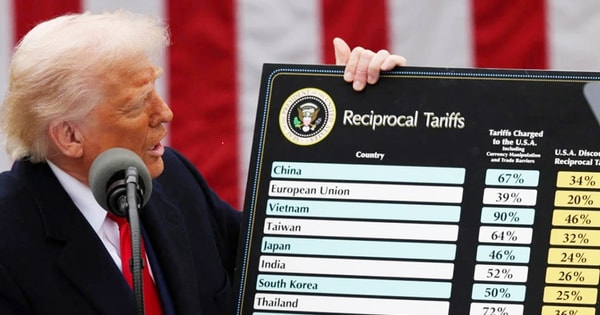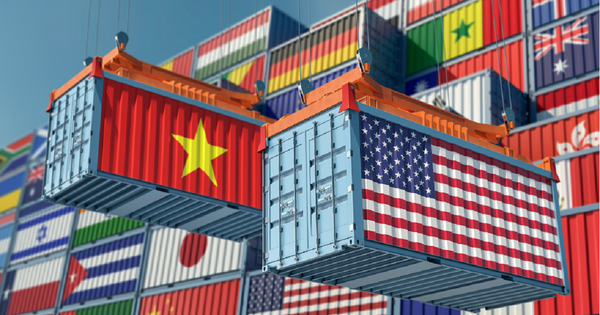"Shocking" move
US President Donald Trump has announced a series of new tariffs aimed at boosting domestic manufacturing, with a base tariff of 10% applied to all imports, along with higher tariffs on a number of trading partners that have high “barriers” to US goods. On this list, China faces a 34% tariff, India 26%, the European Union (EU) 20%, and Japan 24%....

That would bring US tariffs on China, the world’s largest exporter of goods, to 54%, including the 20% tariffs Washington imposed on the Asian nation earlier this year. That figure could rise significantly if the US imposes additional tariffs on countries that buy Venezuelan oil.
The “exceptions” this time are pharmaceutical products, semiconductor components, lumber, gold bullion, energy and some minerals not available in the US.
According to the US President, the new tax on goods entering the US is a way to "liberate" the economy, increase the budget for the federal government to create the premise for tax reduction and revive domestic production. "Faced with the relentless economic war, the US cannot continue the policy of unilateral economic surrender," the US President emphasized in his speech when announcing the new tax policy.
Impact on America
There is no denying the potential positives of Washington’s new tax policy for the United States. Scott Paul, president of the Alliance for American Manufacturing, welcomed the new tax, emphasizing that this is a solution that prioritizes domestic manufacturers and American workers.
However, Lori Wallach, director of Rethink Trade, said that the benefits for American manufacturers should be reinforced with tax credits to stimulate demand for American-made goods and encourage investment in new production capacity. This expert also emphasized that it is necessary to ensure that the profits of American businesses benefiting from the new tariffs are shared equally with workers.
For his part, expert Chris Zaccarelli at Northlight Asset Management expects the new tax to become an important lever, helping Washington have more favorable trade negotiations, bringing benefits to the United States in the long term.
However, there are also "headwinds" as economists warn that the new tax could affect the export capacity of US goods, while increasing the price of everyday goods for people, boosting inflation.
In this regard, David French, an expert from the National Retail Federation of the United States, emphasized that reciprocal tariffs can be seen as a tax on consumers' pockets, increasing their financial burden. JP Morgan's chief economist Michael Feroli even warned that a scenario where consumer purchasing power is negatively affected could lead to the risk of recession for the US economy.
Rising inflation is also seen as likely to put pressure on borrowing costs, leading to a risk of stagnation in US economic activity.
Meanwhile, KPMG expert Diane Swonk noted, the new policy could push tariffs to their highest level since the early 1900s, complicating the Federal Reserve's policymaking and potentially increasing the risk of a recession.
Politically, the new tax is feared to have a negative impact on diplomatic relations between Washington and its partners, affecting many global geopolitical processes.
Investors' anxiety over a series of risks was clearly evident in the financial markets. In the first trading session on April 3, the S&P 500 index fell 3.3%, the NASDAQ 100 fell 4.2%, and the Dow Jones - tied to the industrial average - fell 2.3%.
In Asia, Japan's Nikkei 225 fell more than 4.1% and South Korea's Kospi share average fell more than 2.5%. Australia's ASX 200 fell about 2%. Both were worse than expected.
Major US corporations such as Apple, Nike, and Walmart have also seen significant financial losses, with their stocks falling an average of 7%. Of these, Apple and Nike both have large-scale manufacturing facilities in Vietnam. Similarly, NVIDIA shares fell about 4.5%, and Tesla shares fell 6%.

Nobody wants a trade war
Italian Prime Minister Giorgia Meloni described the new White House tariffs as “wrong” and said they were not in anyone’s interest. However, the Italian prime minister left open the possibility of discussions to reach a deal with the US to avoid a trade war that could weaken the West.
Meanwhile, Australian Prime Minister Anthony Albanese criticized the tariffs as "without logical basis" and "not the actions of a friend." He stressed that Australia would not retaliate and would not engage in a race to the bottom that would lead to higher prices and slower growth.
Expressing a tough stance, Canadian Prime Minister Mark Carney vowed to "fight" against President Donald Trump's tariffs, condemning the White House's move as "fundamentally changing the global trading system". Canada warned that it was preparing retaliatory moves to respond quickly to any trade actions the US would announce.
European Parliament President Manfred Weber criticized Donald Trump's tariffs, saying they do not protect but instead damage the foundations of fair trade, stressing that it would harm both sides of the Atlantic. In fact, the European Union has threatened to implement countermeasures in mid-April.
There are, however, some soft voices. The UK government has expressed its desire to reach a trade deal that would “minimise the impact” of the 10% tariff on British goods. “Nobody wants a trade war,” UK Trade Secretary Jonathan Reynolds said, adding that London’s priority was to negotiate rather than retaliate.
Economists have also warned that the new tariffs could lead to rising inflation and the risk of a global recession. Goldman Sachs has cut its UK growth forecasts due to concerns about the spillover effects of the tariffs.
The tariffs would reverse decades of trade liberalization that have shaped the global order, observers say, and could be exacerbated if America’s trading partners respond with extreme retaliatory measures. Such tariff “barriers” would reduce global industrial output, disrupt supply chains, and drag down economic growth.

There is still a way out
Analysts still point to a way out: the tax rate announced this time is not permanent. In his speech at the Rose Garden, the US President also left open the possibility of adjustment. This means that the tax rate can completely change in the future, once the trading partners successfully negotiate with the US government.
Responding to the new tariffs on television, US Treasury Secretary Scott Bessent also suggested the same thing, saying that President Donald Trump's administration would "wait and see how things play out." However, the official warned countries not to rush into escalating the trade war.
Thus, in the short term, negotiation is the only solution that each country can use to avoid unintended damage. However, economic experts say that efforts in this direction need to be implemented quickly, before economies suffer lasting economic damage.
In the medium term, the issue of US reciprocal tariffs could be brought to international trade organizations such as the World Trade Organization (WTO) to create the necessary pressure to force Washington to adjust its measures. Along with that, diplomatic negotiations within the framework of the G7, G20, etc. are also expected to be able to resolve the tense situation.

In the long term, countries and multinational enterprises affected by this tax policy are also advised to find ways to optimize supply chains and increase domestic production capacity to increase economic autonomy. In the coming time, many large enterprises, especially American enterprises, are predicted to lobby for tax adjustments, in case their business operations encounter difficulties.
Clearly, the international community is extremely concerned about the new US tariffs and their potential future impacts. However, the parties fundamentally do not want a trade war and are willing to negotiate with the world's number 1 economy to find common ground.
Refer to CNBC, Investopedia, The Guardians
Source: https://hanoimoi.vn/chinh-sach-thue-doi-ung-moi-cua-my-thay-doi-buc-tranh-thuong-mai-toan-cau-697715.html


![[Photo] General Secretary To Lam receives Japanese Ambassador to Vietnam Ito Naoki](https://vstatic.vietnam.vn/vietnam/resource/IMAGE/2025/4/3/3a5d233bc09d4928ac9bfed97674be98)
![[Photo] Ho Chi Minh City speeds up sidewalk repair work before April 30 holiday](https://vstatic.vietnam.vn/vietnam/resource/IMAGE/2025/4/3/17f78833a36f4ba5a9bae215703da710)
![[Photo] Prime Minister Pham Minh Chinh chairs meeting after US announces reciprocal tariffs](https://vstatic.vietnam.vn/vietnam/resource/IMAGE/2025/4/3/ee90a2786c0a45d7868de039cef4a712)
![[Photo] A brief moment of rest for the rescue force of the Vietnam People's Army](https://vstatic.vietnam.vn/vietnam/resource/IMAGE/2025/4/3/a2c91fa05dc04293a4b64cfd27ed4dbe)
![[Photo] Prime Minister Pham Minh Chinh chairs the first meeting of the Steering Committee on Regional and International Financial Centers](https://vstatic.vietnam.vn/vietnam/resource/IMAGE/2025/4/3/47dc687989d4479d95a1dce4466edd32)
![[Photo] Capital's youth enthusiastically practice firefighting and water rescue skills](https://vstatic.vietnam.vn/vietnam/resource/IMAGE/2025/4/3/3f8481675271488abc7b9422a9357ada)













































































Comment (0)